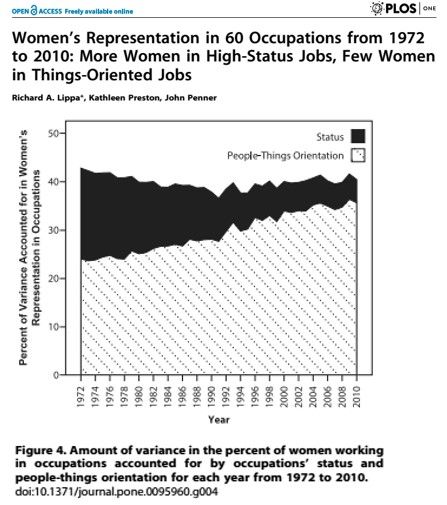Sex
On That Google Memo About Sex Differences
A response to claims psychological sex differences are "incorrect assumptions."
Posted August 7, 2017 Reviewed by Ekua Hagan
A Google employee was recently fired for sharing a memo that referenced some of my scholarly research on psychological sex differences (e.g., personality traits, mate preferences, status-seeking). Google's Vice President of Diversity, Integrity, & Governance, Danielle Brown, deemed the employee's claims "advanced incorrect assumptions about gender." Alongside other pieces of evidence, the employee argued, in part, that psychological research on sex differences indicates affirmative action policies based on biological sex are misguided. Maybe, maybe not. Let's explore the issue.
I think it’s really important to discuss this topic scientifically, keeping an open mind and using informed skepticism when evaluating claims about evidence. In the case of personality traits, evidence that men and women may have different average levels of certain traits is rather strong. For instance, sex differences in negative emotionality are universal across cultures; developmentally emerge across all cultures at the same age; are linked to diagnosed (not just self-reported) mental health issues; appear rooted in sex differences in neurology, gene activation, and hormones; are larger in more gender-egalitarian nations; and so forth (for a short review of this evidence, see here). In my view, claiming that sex differences exist in negative emotionality is not an "incorrect assumption about gender." It is an empirically well-supported claim (at least, based on the best psychological science we have so far).
Still, it is not clear to me how such sex differences are relevant to the Google workplace. And even if sex differences in negative emotionality were relevant to occupational performance at Google (e.g., not being able to handle stressful assignments), the size of these negative emotion sex differences is not very large (typically, ranging between “small” to “moderate” in statistical effect size terminology; accounting for perhaps 10% of the variance1). Using someone’s biological sex to essentialize an entire group of people’s personalities is like surgically operating with an axe. Not precise enough to do much good, probably will cause a lot of harm. Moreover, men are more emotional than women in certain ways, too. Sex differences in emotion depend on the type of emotion, how it is measured, where it is expressed, when it is expressed, and lots of other contextual factors. How this all fits into the Google workplace is unclear to me. But perhaps it does.
As to sex differences in mate preferences and status-seeking, these topics also have been heavily researched across cultures (for a review, see here). Again, though, most of these sex differences are moderate in size and in my view are unlikely to be all that relevant to the Google workplace (accounting for, perhaps, a few percentage points of the variability between men’s and women’s performance outcomes).
Culturally universal sex differences in personal values and certain cognitive abilities are a bit larger in size (see here), and sex differences in occupational interests are quite large2. It seems likely these culturally universal and biologically-linked sex differences play some role in the gendered hiring patterns of Google employees. For instance, in 2013, 18% of bachelor's degrees in computing were earned by women, and about 20% of Google technological jobs are currently held by women. Whatever affirmative action procedures Google is using appear to be working pretty well (at least at the tech job level). Still, I think it's important to keep in mind that most psychological sex differences are only small to moderate in size, and rather than grouping men and women into dichotomous groups, I think sex and sex differences are best thought of scientifically as multidimensional dials, anyway (see here).
Now, treating people as dichotomous sexes is exactly what many affirmative action policies do. As this is not my area of expertise, I can only offer my non-expert opinion on this issue, which is this: There have been (and likely will continue to be) many socio-structural barriers to women working in technological jobs. These include culturally-embedded gender stereotypes, biased socialization practices, in some cultures explicit employment discrimination, and a certain degree of masculinization of technological workplaces. Within this sea of gender bias, should Google use various practices (affirmative action is not just one thing) to especially encourage capable women of joining (and enjoying) the Google workplace? I vote yes. At the same time, should we be able to openly discuss and be informed by some of the real psychological sex differences that account for variation in men’s and women’s workplace performance, and might lead to less than 50% of technology employees being women? In the right context, I vote yes to that, too. Apparently, at Google, internal discussion boards intended for open conversations about diversity and science-based thinking are not the right context for discussing evidence about psychological sex differences.
Footnotes
1 When several dimensions of personality are examined all at the same time, sex differences in personality are rather large. In 2012, Del Giudice and his colleagues simultaneously examined 15 dimensions of personality and found less than 10% overlap in men's and women's multivariate personality distributions. Still, it is unlikely all 15 of these dimensions are relevant to Google workplace performance. Del Giudice, M., Booth, T., & Irwing, P. (2012). The distance between Mars and Venus: Measuring global sex differences in personality. PloS one, 7, e29265.
Moreover, because the employees at Google are a highly select group (e.g., likely possessing extremely high levels of intelligence and interests in technology), any of the sex differences in personality traits observed in the general population may not exist to the exact same degree among Google employees.
2 Sex differences in mental rotation ability are moderate in size across most cultures. In 2007, a 40-nation study documented sex differences in mental rotation ability were culturally universal (Silverman, I., Choi, J., & Peters, M. (2007). The hunter-gatherer theory of sex differences in spatial abilities: Data from 40 countries. Archives of Sexual Behavior, 36, 261-268). A 53-nation study found the exact same thing, and noted sex differences in mental rotation ability were largest in the most gender egalitarian nations (Lippa, R. A., Collaer, M. L., & Peters, M. (2010). Sex differences in mental rotation and line angle judgments are positively associated with gender equality and economic development across 53 nations. Archives of Sexual Behavior, 39, 990-997.).

Similarly, universal sex differences have been documented in personal values (women report higher levels of benevolence and universalism values, whereas men report higher levels of power, achievement, and hedonism values; Schwartz, S. H., & Rubel-Lifschitz, T. (2009). Cross-national variation in the size of sex differences in values: Effects of gender equality. Journal of Personality and Social Psychology, 97, 171–187) and occupational interests (Lippa, R. A. (2010). Sex differences in personality traits and gender-related occupational preferences across 53 nations: Testing evolutionary and social-environmental theories. Archives of Sexual Behavior, 39, 619–636.). In both cases, these sex differences are largest in more gender-egalitarian nations.
Sex differences in occupational interests are actually quite large in statistical terms (with biological sex accounting for 33% of the variance in occupational interests [Lippa, 2010]), and may play a large role in some of the observed sex differences noted by the Google employee. Indeed, women's greater interest in "people" jobs over "things" jobs has become more influential (not less) over historical time in the USA (see below).





